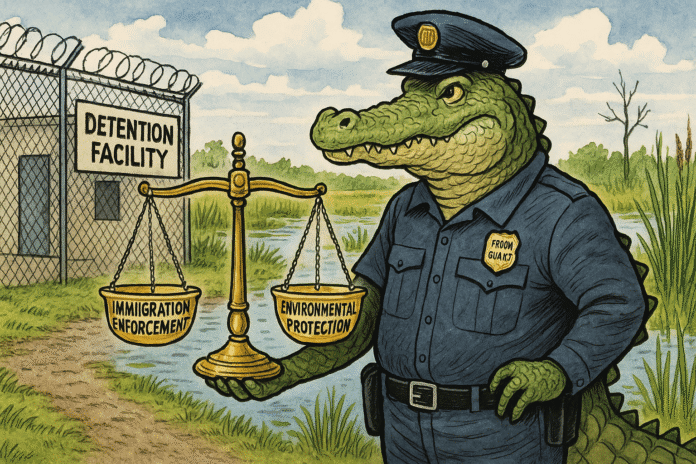Federal Appeals Panel Overturns Judge’s Environmental Shutdown Order for Controversial Florida Immigration Facility
A federal appeals court delivered a major victory to Florida and the Trump administration Thursday, blocking a lower court’s order to shut down the controversial “Alligator Alcatraz” immigration detention facility in the Florida Everglades. The ruling allows the embattled facility to resume full operations while legal challenges continue.
The decision immediately halts what appeared to be the end of one of the most contentious immigration detention centers in America. Environmental groups and Native American tribes had successfully argued that the facility violated federal environmental laws. But now, detainees will likely return to the remote Everglades site that critics have called inhumane.
The Appeals Court Decision That Changed Everything
Split Panel Rules in Favor of Continued Operations
The U.S. Court of Appeals for the 11th Circuit issued a 2-1 decision staying District Judge Kathleen Williams’ preliminary injunction. The panel concluded that Florida officials would likely prove the facility doesn’t fall under federal environmental regulations.
Judge Barbara Lagoa wrote the majority opinion, joined by Judge Elizabeth Branch—both Trump appointees. Judge Adalberto Jordan, an Obama appointee, dissented, arguing the shutdown order should remain in place.
“After careful consideration, we grant the defendants’ motions and we stay the preliminary injunction and the underlying case itself pending appeal,” the majority ruled.
Federal vs. State Control: The Key Legal Issue
The appeals court determined that because Florida built, funds, and operates Alligator Alcatraz independently, it’s not subject to the National Environmental Policy Act (NEPA). This federal law requires environmental impact studies for major federal actions.
“The Facility is a site built, led, operated, and funded unilaterally by a state government—in accordance with the state’s laws—at which the state retains discretionary control over who is detained at the facility,” the majority wrote.
Environmental Groups Fight Back Despite Setback
Plaintiffs Vow to Continue Legal Battle
Environmental organizations and the Miccosukee Tribe expressed disappointment but pledged to continue their fight. Eve Samples, executive director of Friends of the Everglades, told reporters: “The case is far from over. In fact, it’s just starting, and we’re committed to fighting on.”
Elise Bennett, senior attorney at the Center for Biological Diversity, called the ruling “a heartbreaking blow to America’s Everglades and every living creature there.” She added that environmental groups remain confident they’ll “ultimately prevail.”
The Environmental Impact Argument
The lawsuit centers on Alligator Alcatraz’s location in sensitive Everglades wetlands. Environmental groups argue the facility threatens endangered species and pristine habitat. District Judge Williams had agreed, ruling that “the project creates irreparable harm in the form of habitat loss and increased mortality to endangered species in the area.”
Political Victory for DeSantis and Trump
Florida Governor Celebrates Win
Governor Ron DeSantis quickly celebrated the appeals court decision on social media. He declared: “The mission continues. Alligator Alcatraz is, in fact, like we’ve always said, open for business.”
DeSantis has positioned the facility as a deterrent to illegal immigration and a symbol of Florida’s commitment to supporting Trump’s deportation efforts. The governor announced plans for two additional detention centers: “Deportation Depot” in northeast Florida and “Panhandle Pokey” in the Florida Panhandle.
Trump Administration Claims Victory
The Department of Homeland Security praised the ruling as “a win for the American people, the rule of law and common sense.” DHS argued that environmental lawsuits are actually attempts by “open-borders activists and judges trying to keep law enforcement from removing dangerous criminal aliens from our communities.”
The Controversy Surrounding Alligator Alcatraz
Inhumane Conditions and Limited Legal Access
The facility has faced intense criticism since opening in July 2025. Built rapidly on an abandoned airstrip, Alligator Alcatraz houses migrants in tents surrounded by the harsh Everglades environment.
Reports have detailed sweltering heat, bug infestations, and limited food. Members of Congress who visited the facility demanded its immediate closure after witnessing conditions they deemed inhumane.
Legal advocates have also sued over limited attorney access for detainees. The remote location makes it difficult for lawyers to visit clients, potentially violating due process rights.
Trump’s Model for National Expansion
President Trump toured Alligator Alcatraz in July and suggested it could serve as a model for detention facilities nationwide. The administration views the site as cost-effective and practical for its mass deportation plans.
The facility’s isolated location in the Everglades makes escape nearly impossible while keeping detainees far from population centers and support networks.
What Happens Next?
Resume Operations While Appeals Continue
Florida officials have indicated they plan to resume accepting detainees now that the appeals court has lifted the shutdown order. The state had been winding down operations and transferring detainees to other facilities following Judge Williams’ ruling.
The legal battle will continue as appeals courts review the original environmental lawsuit on its merits. Environmental groups remain hopeful that higher courts will ultimately side with their arguments about federal environmental law violations.
Multiple Legal Challenges Remain
Beyond the environmental lawsuit, Alligator Alcatraz faces several other legal challenges. Advocates have filed suits over attorney access and whether Florida has legal authority to operate immigration detention facilities at all.
These ongoing cases could still threaten the facility’s operations even if the environmental challenge fails.
The Broader Immigration Detention Debate
Part of Massive Expansion Plans
Alligator Alcatraz represents just one piece of the Trump administration’s broader immigration enforcement strategy. ICE arrests have surged since Trump took office, creating demand for additional detention beds across the country.
The administration has partnered with Republican-led states to rapidly expand detention capacity. Florida alone plans multiple new facilities to support federal deportation efforts.
Balancing Enforcement and Environmental Protection
The legal battle over Alligator Alcatraz highlights tensions between immigration enforcement and environmental protection. Environmental groups argue that no enforcement goal justifies damaging pristine ecosystems like the Everglades.
Supporters counter that immigration law enforcement serves compelling public interests that outweigh environmental concerns, especially for temporary facilities.
Call to Action
The Alligator Alcatraz controversy raises fundamental questions about immigration policy, environmental protection, and government accountability. While the appeals court has given the facility a temporary reprieve, the underlying issues remain unresolved.
Citizens concerned about either immigration enforcement or environmental protection should engage with their elected representatives. The outcome of ongoing legal battles will set important precedents for how America balances enforcement priorities with environmental stewardship.
Stay informed about developments in this case and others affecting immigration policy and environmental law. The decisions made today will shape America’s approach to these critical issues for years to come.




